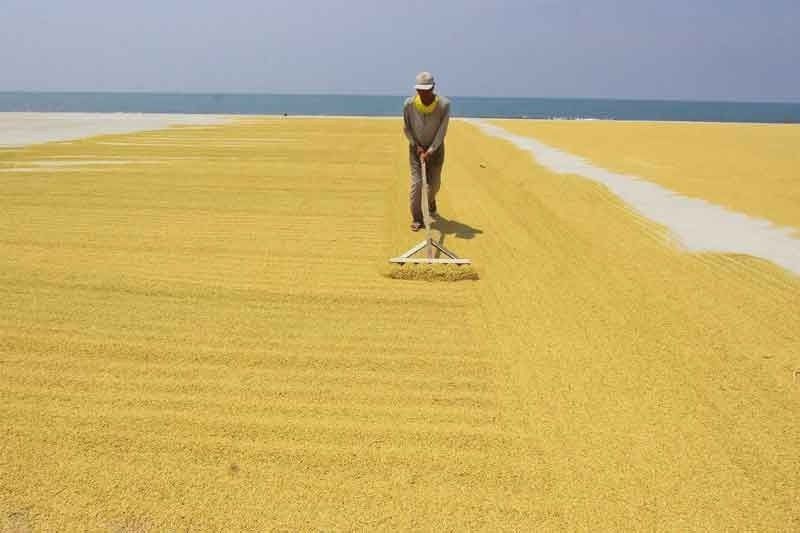NFA council sets palay buying price at P19/kilo

MANILA, Philippines — The National Food Authority (NFA) Council has agreed to fix the buying price for clean and dry palay with 14 percent moisture content at P19 per kilogram and wet palay with 30 percent moisture content at P14 per kilogram.
It is one of two measures approved by the council during an emergency meeting last Tuesday to drive down the retail prices of rice and sustain its local palay-buying operations, as announced by Agriculture Secretary William Dar yesterday.
The NFA Council also resolved to flood Metro Manila and other markets nationwide with 3.6 million 50-kilogram bags of rice, making up NFA’s old imported stocks valued at P4.86 billion.
The proceeds from the sale of old stocks can be readily used to procure palay from farmers.
The NFA was given until Oct. 10 to dispose of old stocks stored in its warehouses at a release price of P25 per kilogram to retailers for distribution at P27 per kilogram.
Dar said beginning today, there will be NFA trucks delivering cheap rice to major markets nationwide.
“We really need to synchronize and harmonize all our activities to bring down rice prices in the market while increasing the income of palay farmers,” he said.
NFA administrator Judy Carol Dansal said flooding the market with old stocks could drive down retail prices to between P32 and P34 per kilogram from the current range of P36 to P40 per kilogram.
Dar said the DA has also secured the commitment of 30 provincial governments to buy palay from their farmers directly.
The Department of Agriculture is also set to forge an agreement with the Department of Social Welfare and Development (DSWD) to give rice to its beneficiaries instead of providing the P600 rice subsidy for qualified recipients of the conditional cash transfer program.
The DSWD will have the option to buy either from the NFA or provincial governments buying palay directly from farmers. This will give farmers an assured market for their palay.
During the council meeting, Dar said the NFA was also directed to undertake a comparative palay production cost study per region to come up with a basis for more responsive palay pricing policies.
The agriculture chief added that the two measures are meant to balance out the interests of farmers and consumers as the effect of the new rice trade regime is felt in the economy.
“These twin measures form part of the government’s interventions to help local producers of the staple grain cope with the falling prices and allow consumers to enjoy more affordable prices,” he said.
Dansal said the market is still adjusting to the Rice Tariffication Law, which is in line with the country’s international trade commitments.
“Let us give a chance to the new law. This administration has enacted that law because it is a commitment of the government to the World Trade Organization as a member,” she said.
The Landbank is also slated to roll out a new credit mechanism for rice farmers, according to Dar.
The new buying price for palay raises the support price from P17 per kilogram, but effectively lowers the potential earnings of farmers because the more than P3 per kilogram incentive for buffer stocking, drying and delivery incentives will be removed.
Dansal said even at this buying level, farmers are still assured of income as the average palay production price in the country is now placed at P12 per kilogram.
Dar said fixing the palay-buying price at P19 per kilogram will result in an additional income of P8,000 per farmer, based on the current national average yield of four tons per hectare.
Dansal said this is essentially meant to encourage farmers to sell clean and dry palay ready for milling and immediate distribution. This will enable the NFA to distribute rice to markets faster while managing its procurement capability.
She added that farmers who do not have access to drying facilities, could still opt to sell their produce to the NFA for the wet buying price of P14 per kilogram or use the drying facilities of NFA for a fee and sell the palay to the authority for P19 per kilogram.
The NFA is looking into the possibility of providing the use of drying facilities for free but this is still not assured, according to Dansal.
Adjusting the palay-buying prices, she said, is also meant to rationalize the incentives provided to farmers, not all of whom are availing themselves of it and in anticipation of the mechanization aid that will be provided to farmers under the new rice tariffication regime.
This is also meant to sustain the agency’s palay-buying operations amid limited resources.
The agency aims to procure four percent of the country’s domestic palay output equivalent to 723,000 metric tons for the year. The agency has so far procured 300,000 MT this year – still a small portion of the 19 million MT domestic palay production.
Leading industry to death
The Philippine rice industry is heading toward its death if the farmgate prices of palay continue to fall due to the Rice Tariffication Law as well as lack of support for farmers, according to a legislator.
In a television interview with One News, Magsasaka party-list Rep. Argel Joseph Cabatbat said farmgate prices of palay now range from P7 to P10, which is below the average production cost of P12.
“If this will continue talagang wala nang magtatanim (no one will plant palay anymore). Any reasonable farmer will not engage in palay and the rice industry if prices are that low,” Cabatbat said.
“And since the government cannot respond immediately to the needs of the farmers, we are looking at the death of the rice industry as we know it,” he added.
Cabatbat emphasized that the Rice Tariffication Law has indeed liberalized the importation of rice; however, farmgate prices of palay should not be this low.
“We still blame the Rice Tariffication Law for the decline of farmgate prices of palay. Yes, we are not discounting the fact that this may also be caused by artificial causes, like trader orders, cartel,” he said.
The party-list representative said they suspect that there are still traders in the market taking advantage of the law.
“I think they should also be partly blamed for the decrease of the farmgate prices of palay,” Cabatbat said. – With Catherine Talavera, Jess Diaz, Ding Cervantes, Cecille Suerte Felipe
- Latest
- Trending




























